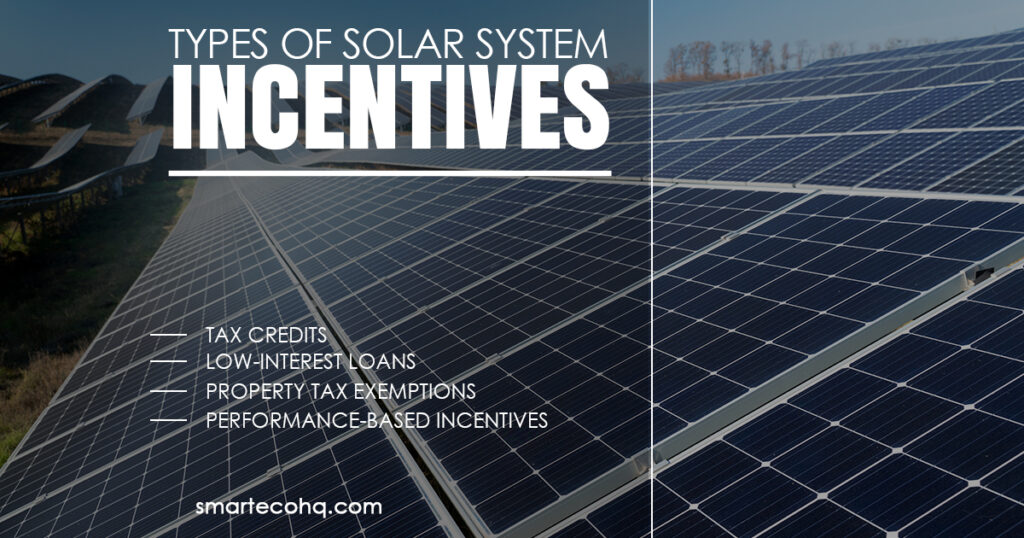Solar Panel Incentives by State Guideline

Discover state-specific solar panel incentives! Maximize your savings today with our comprehensive guideline. Click now for the latest incentives by state.
Types of Solar System Incentives:
States can provide a variety of incentives to stimulate the installation of solar panels, including:

Tax Credits:
Tax credits are Credits that may be applied to a Homeowner’s Tax Bill, lowering the overall cost of installing solar panels. Tax credits are either refundable or non-refundable, and the amount varies by state.
Rebates:
Rebates are Direct Incentives offered to Households that Install Solar Panels. These payments can vary in magnitude and are frequently determined by the size of the solar panel system.
Performance-Based Incentives:
Performance-based Incentives are Dependent on the Amount of Power produced by a Solar Panel Installation. Homeowners get paid based on the quantity of energy generated, which can help cover installation costs.
Property Tax Exemptions:
Property tax breaks are available in several areas for homeowners that install solar panels. This can lower overall house ownership costs and make solar energy more appealing.
SRECs (Solar Renewable Energy Credits):
These are credits that allow solar panel system Owners in some jurisdictions to Create and Sell Credits depending on the quantity of clean energy produced by their system. These credits can then be sold to utility companies that must fulfill renewable energy mandates.
Low-interest loans:
These are financial incentives offered by some states in order to stimulate the installation of solar panels. These Loans offer Lower Interest Rates than Regular Loans and can help homes or businesses pay the upfront costs of establishing a solar panel system.
| Net Metering: Net metering is a Billing Structure that allows customers to Earn Credit for the Extra Electricity they Create and Transmit back to the Grid. The customer’s energy meter records both the power they use from the grid and the surplus electricity they give back to the grid, and they are only billed for the “net” quantity they consume. |
Incentives provided by State:
| State | Incentive | State | Incentive |
|---|---|---|---|
| Alabama | — | Alaska | — |
| Arkansas | Offers net metering | Arizona | Offers tax credit up to $1,000 and property tax exemption |
| California | Offers net energy metering, property tax exemption, and more | Colorado | Offers tax credit up to $2,000, net metering, and performance-based incentives |
| Connecticut | Offers net metering and property tax exemption | Delaware | Offers net metering and solar renewable energy credit program |
| Florida | Offers property tax exemption, net metering, and solar rebate program | Georgia | — |
| Hawaii | Offers net metering, solar tax credit, and more | Idaho | Offers net metering |
| Illinois | Offers net metering | Indiana | Offers net metering |
| kansas | Offers net metering | Lowa | Offers net metering |
| kentucky | Offers net metering | Louisiana | Offers net metering |
| Maine | Offers net metering and property tax exemption | Maryland | Offers net metering and property tax exemption |
| Missouri | Offers net metering | Michigan | Offers net metering |
| Nebraska | Offers net metering | Montana | Offers net metering |
| Minnesota | Offers net metering and property tax exemption | Massachusetts | Massachusetts: Offers solar loan program, solar renewable energy credit program, property tax exemption, and more |
| Mississippi | — | Nevada | Offers net metering, property tax exemption, and more |
| New York | Offers tax credit up to $5,000, net metering, property tax exemption, and more | New Jersey | Offers net metering, property tax exemption, and more |
| New Mexico | Offers net metering | New hampshire | Offers net metering |
| North Carolina | Offers net metering | North Dakota | Offers net metering |
| Ohio | Offers net metering | Oklahoma | Offers net metering |
| Oregon | Offers net metering | Pennsylvania | Offers net metering |
| Rhode Island | Offers net metering, property tax exemption, and more | Texas | Offers property tax exemption, solar rebate program, and more |
| Virginia | Offers net metering, property tax exemption, and more | Tennessee | No incentives offered |
| South Carolina | Offers net metering | Utah | Offers net metering |
| South Dakota | Offers net metering | Vermont | Offers net metering |
| Wisconsin | Offers net metering | Wyoming | Offers net metering |
| West Virginia | Offers net metering | Washington | Offers net metering |
Individuals and companies interested in installing renewable energy systems should do their homework and grasp the incentives available in their state. They may make their renewable energy projects more financially viable and contribute to a more sustainable future by taking advantage of these advantages.






